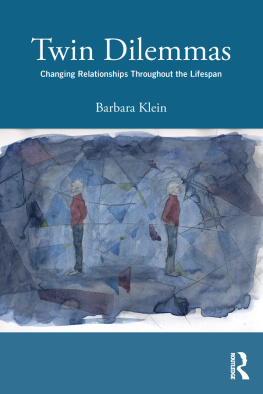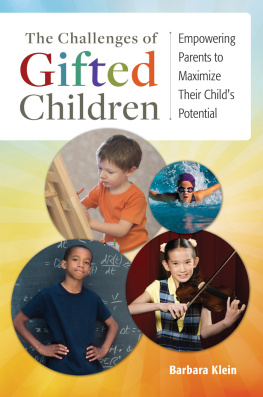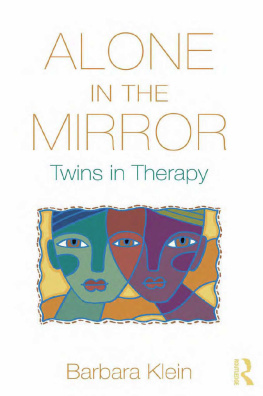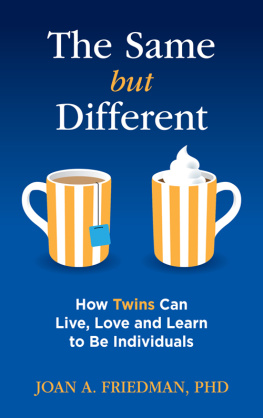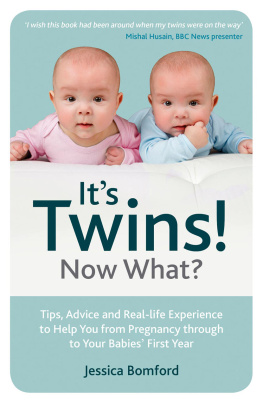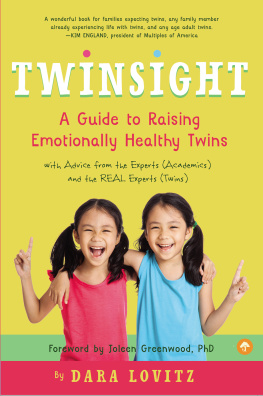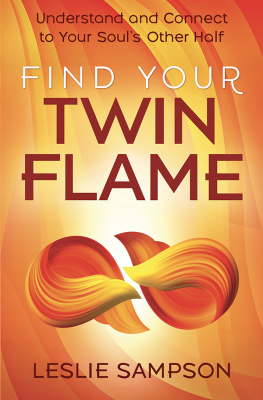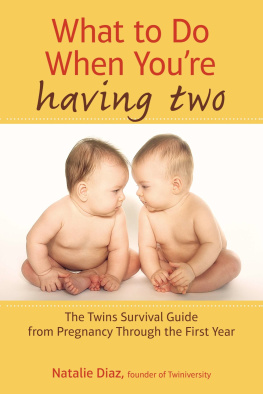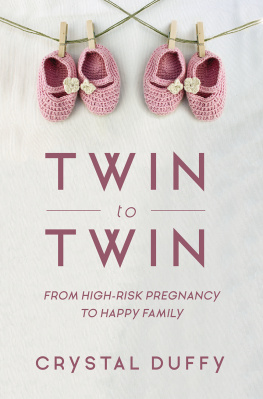
The author developed a well-organized volume, and her focus and approach are presented in an accessible form in this field. I believe that the authors ideas are new and unique in the sense described as follows: 1. She beautifully describes distinctive features in the relationship of twins for each developmental stage. 2. She illustrates emotional conflict in the twin-ship which are organized around shared ego boundary and closeness (and distance). 3. She describes why and in what sense non-twins could not easily understand the delicate emotional balance between twins. 4. She demonstrates the key issues to be addressed by mental health professionals who see a twin patient.
Koichi Togashi, PhD, LP, professor, Konan University, Kobe, Japan
Are you a twin? Have you met a twin? Yes? No? Either way, you need to read Twin Dilemmas. It gives the best evidence-based description of issues and applied suggestions for positive communication you can find. The book offers an example of systematic qualitative research based on identity types and transaction patterns. Written with clarity and accuracy, we experience the world around the lives of twins and learn from it. We get to look through the window and see the dilemmas lived by twinsand ourselves! This is a basic reference book for human science research and teaching.
Richard L. Lanigan, PhD, executive director and Fellow, International
Communicology Institute, Washington DC, USA; university distinguished scholar, professor of communicology (emeritus), School of Communication, Southern Illinois University; Senior Fulbright Fellow (China 1996, Canada 2007); Fellow of the International Academy for Intercultural Research; Fellow, Polish Academy of Science (Philology)
Dr. Kleins focus on employing intersubjectivity theory is timely and practical, and her unique expertise will add depth to her discussions.
Stu Wolman, MD, board certified in pediatrics and child and adult psychiatry; private practice; training and supervising analyst, Institute of Contemporary Psychoanalysis, Los Angeles, USA
It is psychologically hard living as a twin within the non-twin world. Twins facing a wide range of psychological challenges, ranging from depression, loneliness, anxiety, confusion, and disappointment, or those simply seeking greater understanding, will find huge value in Dr. Kleins Twin Dilemmas. The culmination of 35 years of professional endeavor, this work continues the amazing expert service she delivers to twins worldwidethat of providing insight into what it means to be a twin.
Dr. Stephen Hart, MA, FRHistS, Department of War Studies, The Royal Military Academy Sandhurst, UK
A twins relationship is forever complicated. Barbaras gifted mind combines poignant twin narratives with counseling insights, forming vivid depictions of the certain but changing struggles twins face over a lifetime. Twins/multiples are rising in number, yet this deepest of human connections is still misguided by ill-equipped parents and support specialists, causing paralyzing outcomes. Twins will be grateful beneficiaries of ditching the cultural cuteness obsession for twins and assuming genuine responsibility for each twins uniqueness.,
Lynn Kraus Boberg, BA in psychology and K-8 education; an identical twin
Non-twins have no clue! The energy and complexity of the twin relationship is very different from usual sibling relationships. This book will be tremendously helpful for parents of twins who seek to nurture and understand their children. Easily accessible and well organizedthere are new insights at every page turn.
Louise Thomson, MBChB FRACP, physician; mother of girl-boy twins
Twin Dilemmas
The development of how twins relate to each other and their single partners is explored through life stories and clinical examples in this telling study of twin interconnections. While the quality of a nurturing family life is crucial, Dr. Klein has found there are often issues with separation anxiety, loneliness, competition with each other, and finding friendships outside of twinship. When twin lives are entwined because of inadequate parenting and estrangement, twin loss is possible and traumatic, creating a crippling fear of expansiveness an inability to be yourself. Therapists and twins seeking an understanding of twin relationships will find this clinically compelling book a valuable resource.
Barbara Klein, PhD, has a doctorate in child development and clinical psychology. She consults nationally and internationally with twins and parents of twins about developing individuality and maturity in twin relationships. She is the author of Alone in the Mirror: Twins in Therapy (Routledge, 2012) as well as eight other books.
Twin Dilemmas
Changing Relationships Throughout the Lifespan
Barbara Klein

First published 2017
by Routledge
711 Third Avenue, New York, NY 10017
and by Routledge
2 Park Square, Milton Park, Abingdon, Oxon, OX14 4RN
Routledge is an imprint of the Taylor & Francis Group, an informa business
2017 Taylor & Francis
The right of Barbara Klein to be identified as author of this work has been asserted by her in accordance with sections 77 and 78 of the Copyright, Designs and Patents Act 1988.
All rights reserved. No part of this book may be reprinted or reproduced or utilised in any form or by any electronic, mechanical, or other means, now known or hereafter invented, including photocopying and recording, or in any information storage or retrieval system, without permission in writing from the publishers.
Trademark notice: Product or corporate names may be trademarks or registered trademarks, and are used only for identification and explanation without intent to infringe.
Library of Congress Cataloging in Publication Data
A catalog record for this data has been requested
ISBN: 978-1-138-69356-2 (hbk)
ISBN: 978-1-138-69357-9 (pbk)
ISBN: 978-1-315-53041-3 (ebk)
Typeset in Baskerville
by HWA Text and Data Management, London
Contents
Jacqueline M. Martinez, PhD
I am a twin. Nothing in my life goes unaffected by this fact. Yet, it wasnt until I was 48 years old that that I began to recognize the full impact of my twinship in my life. I have always known that I can never stop being a twin. What is it like to be a twin? I remember being asked this question over and over again starting from the time I was very young. My response was honest, simple, and always the same: I dont know because I dont know what its like to not be a twin. I could not have possibly recognized how insightful my answer was when I first spoke it. Only decades later have I come to see the powerful consequences of this simple fact.
Because I was born a twin, I learned what its like to be deeply connected to another human being. Twins learn to understand another person as oneself. In my adult life I have been frustrated in my efforts to connect with other people, mostly because my primary measure for connection and understanding came from being a twin. I didnt understand why I couldnt create that twin level of connection with singletons. I didnt recognize the difference between my twin world and the non-twin world that I lived in. Its a double-edged sword because my desire to connect with others has often proven to be an asset. I am a good listener. I work very hard to see the world from other peoples perspective. Im very empathetic. I always try to establish understanding. On the other hand, it is very taxing to spend so much time trying to make such deep connections with people in general. Ive been seriously depressed through major portions of my life. I struggled in therapy with therapists who did not recognize the importance of my being a twin in understanding why I was struggling so much. What seems obvious to me nowthat my most severe depression emerged shortly after I moved away from my twinwas completely missed, and even dismissed, by therapists. It was only after I began working with Dr. Klein that I began to recognize the reasons why I struggled so much.
Next page
